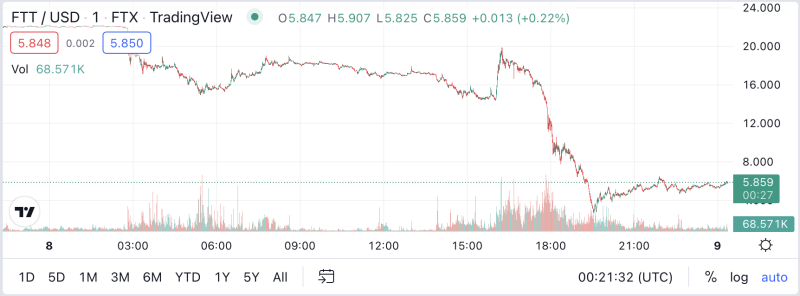Crypto trading and lending firm Genesis Trading and wallet provider Crypto.com are among the latest companies to distance themselves from the FTX liquidity crisis.
The two firms took to Twitter to reassure customers of their limited exposure to the events that sent the crypto industry into a frenzy earlier today.
“With regard to today’s market events, we have managed our lending book and have no material net credit exposure,” Genesis tweeted from its official company account without naming FTX by name. “In addition, Genesis has no exposure to any tokens issued by centralized exchanges.”
Crypto.com CEO Kris Marszalek also addressed the market via Twitter, saying his company’s exposure to the situation is limited. The crypto exchange has more than 70 million users.
“Our direct exposure to [the] FTX meltdown is immaterial: less than $10 million in our own capital [is] deposited there for customers’ trade execution,” Marszalek said. “That’s very little compared to our global revenues surpassing US$1 billion for two consecutive years.”
Earlier today, FTX founder Sam Bankman-Fried announced the bombshell that Binance plans to acquire the non-U.S.-based business FTX.com — just a few hours after The Block reported that FTX had stopped processing withdrawals. Several other heavyweight crypto firms — such as Bitpanda, Circle and Tether — have since distanced themselves from the fallout, which is likely to be far-reaching.
BlockFi co-founder Flori Marquez said all of the company’s products were “fully operational” and clarified that the business is independent from FTX. The Block learned in June that FTX was looking to acquire BlockFi outright. Coinbase CEO Brian Armstrong also tweeted that the crypto exchange had no material exposure to FTX nor its FTT token.
In his tweets, Crypto.com’s Marszalek added that the crypto industry must “collectively work twice as hard to rebuild the trust lost today,” and called on regulators to “strengthen and safeguard” the industry.
“We have always maintained 1:1 reserves and believe that doing so is the most basic operating principle,” Marszalek wrote. “We will push for increased transparency and regulation of the industry to ensure this is the standard by which all crypto platforms operate.”
News of FTX’s acquisition came just two days after Binance CEO Changpeng Zhao tweeted on Nov. 6 that the company would be selling off its position in FTX’s native FTT token, after what he called “recent revelations.” On Nov. 2, a CoinDesk article revealed certain details of the inner workings of Alameda Research, a crypto trading firm Bankman-Fried also owns. After Zhao’s tweet raised concerns about the health of Bankman-Fried’s businesses, he said FTX was “fine” in a since-deleted tweet on Nov. 7. FTX halted withdrawals a day later, before the deal with Binance was made public.
© 2022 The Block Crypto, Inc. All Rights Reserved. This article is provided for informational purposes only. It is not offered or intended to be used as legal, tax, investment, financial, or other advice.
Go to Source
Author: Kristin Majcher


